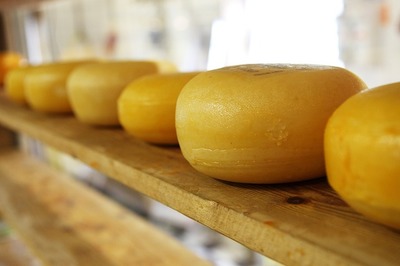New Research Finds Avian Flu in Raw Milk Cheese
Sunday, March 23rd, 2025 -- 7:54 AM

(Hope Kirwan, Wisconsin Public Radio) While avian influenza continues to spread to U.S. dairy farms, foods like milk, butter and cheese have largely been unaffected.
According to Hope Kirwan with the Wisconsin Public Radio, pasteurization, the process of heating raw milk to get rid of harmful bacteria before processing, has been proven to kill the virus.
But new research suggests avian flu could be a threat to specialty producers that rely on aging instead of heat to create unique cheeses. Preliminary results from federally funded research at Cornell University found that the standard 60-day aging process used for raw milk cheese was not effective at killing avian flu.
The study used both laboratory models mimicking the cheesemaking process and samples of commercially made cheese from a dairy that inadvertently used contaminated raw milk.
Scott Rankin, food science professor at the University of Wisconsin-Madison, said it’s not a surprise that the avian flu virus has the ability to survive under some conditions.
Raw milk cheeses fall under a unique exception to food safety regulations, which largely require pasteurization for dairy products. Rankin said only certain low-moisture cheese types like cheddar can be made from raw milk if they are held for at least 60 days at a room temperature above 35 degrees Fahrenheit.
“At that time and at that temperature, there would be a continued consumption by the culture bacteria in the cheese to slowly continue fermentation, slowly continue to drop the pH,” he said. “The thought was that process would eliminate any pathogen that may have come in through the raw milk.”
In the last 30 years, Rankin said some in food science have questioned whether the aging process is an infallible approach. He said there is evidence that harmful bacteria can survive past the 60 days in certain circumstances.
But Rankin said cheese producers who make raw milk products take extra precautions to prevent pathogens from being introduced. That includes paying special attention to dairy cow health and sanitation practices within their plants.
“Good manufacturers of raw milk cheese have a terrific track record of safe product, and I don’t think that’s changed based on the emergence of the avian flu virus,” he said.
Rankin pointed out that sampling of commercially available raw milk cheese by the U.S. Food and Drug Administration has not found evidence of the virus.
The agency reported Friday that of the 110 samples of raw milk cheese taken between January and early March, 96 tested negative for avian flu and the remaining 14 were still in process.
The agency plans to take 189 more samples and the final results will be available in late spring.
Feel free to contact us with questions and/or comments.




